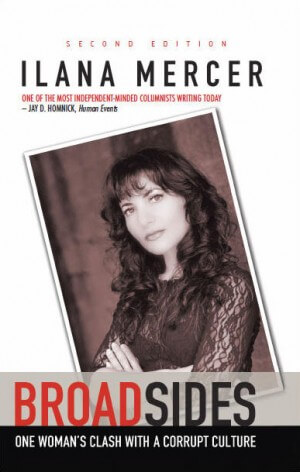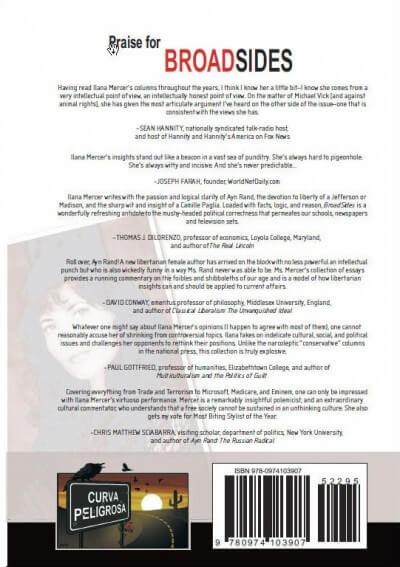The Following is An Excerpt From the Introduction to “Broad Sides: One Woman’s Clash With A Corrupt Culture” (2004)
by Ilana Mercer
In post-September-11 America, the one emotion dominating the culture is anxiety—a vague, amorphous uneasiness about the future. It’s not only that Americans worry and war over foreign threats to their lives and liberties. They also sense a vague uneasiness about the health of their own society, about what many believe is the steady erosion of their nation’s moral and cultural infrastructure.
I, for one, believe that this cultural degeneration is the more fundamental cause for concern. The greatest menace to our free civil society comes not from without, but from within. I also believe that when the state—backed by the force of law and power of police—comes to foster and manage this social deconstruction, the demise of civil society is near guaranteed and nearer at hand than we think.
This cultural chaos has left many feeling adrift, and seeking the anchor of some sort of moral principle. But with the collapse of traditional standards, more than a few have turned in desperation to mysticism, New Age beliefs, or the solace of communitarianism—what one wag called “the warm smell of the herd.”
Such placebos have now all but replaced the principles that fostered the triumphant rise of our civilization. The legacy of American thought—reason, objectivity, individualism, self-responsibility, liberty—has been expunged from our institutions. In its place we have elevated irrationalism, subjectivity, collectivism, self-indulgence, and statism.
How, then, do we combat these ominous trends?
A free society requires, above all, a thinking people. To protect our liberty—the liberty bequeathed to us by the Enlightenment classical-liberal founders—and to restore a healthy culture, we must return to reason. And as a first step, we must free our minds from the popular myths and corrosive dogmas that have led us to this sorry state.
That’s my mission in my book, Broad Sides: One Woman’s Clash With A Corrupt Culture, a second edition of which will soon be available (2009).
Whether I’m reviewing a film, critiquing art and music, or discussing the collapse of boundaries between private and public life—whether I’m defending creative social benefactors such as Bill Gates and Martha Stewart, or off-shore tax havens, or the deregulation of commerce and trade—my goal in these pages is to goad, prod, and otherwise motivate people to think in fresh ways about the issues of the day, to look beyond the corrupting clichés that have dragged our society to the brink.
Broad Sides opens with First Principles. The inalienable rights of life, liberty and property are meaningless unless we understand what individual rights are. Once authentic rights are distinguished from bogus rights, it also becomes clear how essential are the principles of self-defense (including national defense), absolute property rights, American republicanism, and sound money to our well-being—in fact, to the preservation of human life itself.
Chapter II flows from its predecessor. Since recognition of individual rights is so vital to our lives and happiness, why are we up to the gills in coercive regulations? When it molests you for engaging in peaceful capitalistic acts—be it accruing and exchanging information others don’t have (“insider trading”), or making an excessively popular product (“market monopoly”)—government is tampering with your liberty and livelihood, and thus threatening your very existence.
It doesn’t take a village to raise well-adjusted children, and it certainly doesn’t take state-sponsored day care. But it does take traditional morality, etiquette, and family. In the Chapter entitled “Private Life on the Public Stage,” topics such as sexual exhibitionism, schoolyard slayings, family life and feminism, even blogging, serve to illustrate what happens when private life goes public.
In “The Arts and the Artless” I emphasize the indispensable value of objective standards for assessing all cultural products. I temper racy film reviews with pieces on art, music, the media, and Things that go bump in the night … like Monica Lewinsky. Today, the ethical and aesthetic order has been inverted. Good stuff—Bach—is uncool. Bad stuff—”Piss art”—is hip. But maddening as it is, documenting the decay of the Zeitgeist can be a lot of fun.
A free society cannot be sustained in an unthinking culture. Nor can a free society function unless its members assume or are made to assume full responsibility for their actions. The main theme of the chapter entitled “Twenty-First-Century Voodoo” is self-responsibility. What has that to do with “the psychiatric articles of faith” this section attacks? Simply this: Backed by junk science, contemporary “healers” are doing away with right and wrong and with civil society’s ability to give its irresponsible members a good corrective kick.
Chapter VII traces “The War for Western Values” from ancient Egypt and the pyramids’ modern raiders, to the “Noble Savage” that roamed the Americas, to the taverns of terrorism in Afghanistan, Israel, and Montgomery County. The survey terminates, fittingly, in the United States of America. “The War for Western Values” must be waged at home, because it is here that the last remnants of reason and liberty are under siege.
In the final section, “Western Values Versus Imperial Ambitions,” I provide a chronological ramp-up to the war in Iraq. The predictive value of the columns is indisputable. Controversial, even heretical, when first penned, they expressed opinions absent at the time from mainstream media. That these views on the war—its prosecutors, their propaganda, and those they persecuted—are now, belatedly, being echoed in the mainstream press is vindicating.
In sum, Broad Sides is a personal manifesto, on one level aimed at rolling back the modern Leviathan State and reclaiming civil society. More fundamentally, the essays collected in this volume offer a wide-ranging exploration of contemporary life through the filter of timeless principles—principles that led to the West’s ascendancy, and whose neglect has led to its disastrous decline.
The second edition of Broad Sides, a libertarian manifesto published by Curva Peligrosa, an imprint of Bytech Services, is now available. To pre-order your Christmas copy/copies from the publisher, click HERE. Or go to Amazon, where it is now in stock. Sign-up for the Mercer Mailing List to receive Ilana’s weekly column as well as notice of her upcoming book.
Peter Brimelow, ever so kindly and under great personal duress, wrote the Foreword to this, my first book, Broadsides: One’s Woman’s Clash With A Corrupt Culture. This most observant of men observed the following:
Somewhat to my surprise, it is actually quite rare for this most emotionally intense of columnists to draw on … personal experiences. What seems to motivate Ilana, ultimately, is ideas
True. From “A Passion For Justice: Ilana Mercer,” the Foreword to Broad Sides https://vdare.com/articles/a-passion-for-justice-ilana-mercer by PETER BRIMELOW, editor, VDARE.com, and best-selling author of Alien Nation: Common Sense About America’s Immigration Disaster , and The Worm In The Apple: How The Teacher Unions Are Destroying American Education



